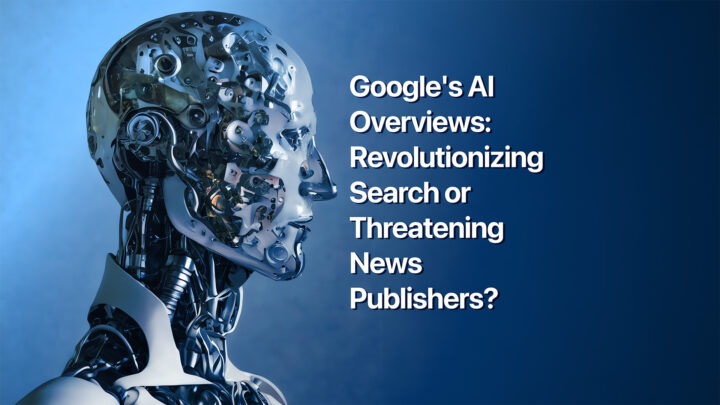Google’s AI Overviews: Revolutionizing Search or Threatening News Publishers?
|
Click play to LISTEN to the article below
|

Introduction
In a world where technology is rapidly advancing, the way we search for information has undergone significant changes. With Google leading the charge, their latest rollout of AI-powered search features, including AI Overviews (formerly known as Search Generative Experience), promises to revolutionize how we interact with search results. However, this innovation also poses a considerable threat to news publishers who rely on organic traffic for revenue and visibility.
The Impact of Google’s AI Overviews
Google’s introduction of AI Overviews has raised concerns among industry experts about its potential impact on publisher traffic, click-through rates, and overall revenue. As these features push organic search results down the page, it becomes increasingly difficult for publishers to maintain their visibility in search rankings.
According to a report by Press Gazette, AI Overviews have pushed first-page search results as far back as position five or lower on Google’s search engine. This dramatic shift could lead to significant traffic and revenue losses for news publishers who depend heavily on these organic clicks.
Furthermore, the widespread adoption of AI Overviews may result in users becoming less inclined to click through to publisher websites as they can now receive quick answers directly from Google’s summaries. This trend could have a severe impact on industries such as healthcare, e-commerce, and B2B technology, which are already feeling the effects of AI Overviews.
Concerns about Accuracy and Trust
Early iterations of AI Overviews faced criticism for inaccuracies and bias, raising concerns over their reliability as a source of information. While Google claims to be addressing these issues, there is still the potential for misinformation to spread through its summaries. This concern was highlighted by Press Gazette when they found that even newsy searches were returning AI-generated summaries, effectively positioning Google as a publisher in its own right.
The Evolution of Search Behavior
As users become more accustomed to AI-powered experiences, their engagement with traditional search results may decline. This shift could result from the convenience and efficiency offered by AI Overviews that provide quick answers without requiring extensive navigation or research.
Google’s Perspective on AI Overviews
Despite concerns raised by publishers, Google maintains that AI Overviews improve user experience and lead to “higher quality” clicks. They argue that users are more likely to stay on the recommended page because of better information retrieval and helpful web content. However, Google has yet to release data supporting this claim.
Industry Response
Publishers have expressed their concerns over the lack of transparency from Google regarding AI Overviews’ impact on publisher traffic and revenue. They are calling for more collaboration between industry stakeholders and Google to address these issues while recognizing the value of original content in a rapidly evolving search landscape.
Key Takeaways and Recommendations
To adapt and thrive amidst this AI-driven search environment, publishers must prioritize high-quality content, optimize for user intent, and explore new distribution channels to maintain their relevance. Industry experts like Jim Yu from BrightEdge emphasize the importance of managing one’s presence in search as more complex but ultimately rewarding work.
- Publisher-Focused Content Optimization:
- Develop a content strategy that focuses on user intent and relevance to improve visibility within organic search results. This includes creating high-quality, targeted content for specific keywords, topics, and demographics.
- Diversify Distribution Channels:
- Explore alternative distribution channels such as social media platforms, email newsletters, podcasts, or video content to reach a broader audience beyond traditional search results.
- Monitor and Address Bias in AI Summaries:
- Regularly monitor AI-generated summaries for accuracy, bias, and misinformation. Publishers should work with Google to address concerns and ensure that content provided by these overviews is factually correct and unbiased.
- Advocate for Transparency and Fair Competition:
- Join industry associations or coalitions to advocate for transparency in the AI Overview rollout, fair competition policies, and regulations that protect intellectual property rights and promote a diverse news ecosystem. This could involve lobbying efforts with policymakers, engaging in public discourse, and participating in industry-wide initiatives to address these issues.
- Leverage Data Analytics:
- Utilize data analytics tools to assess the impact of AI Overviews on publisher traffic and revenue. This information can help inform strategic decisions such as content optimization, distribution channel diversification, or collaborative efforts with Google.
- Embrace Innovation in Content Formats:
- Experiment with new content formats like interactive infographics, data visualizations, or immersive experiences to enhance user engagement and differentiate from AI-generated summaries. This can help publishers provide unique value propositions that cater to users’ evolving preferences in the digital landscape.
- Foster Partnerships with Other Publishers:
- Collaborate with other news organizations, both within and outside of your industry, to share resources, knowledge, and best practices for adapting to AI-driven search changes. This can help publishers collectively address challenges while promoting a diverse and sustainable news ecosystem.
Conclusion
While AI-powered search features like Google’s AI Overviews hold the promise of enhancing user experience by providing quick answers to their queries, they also pose significant challenges for news publishers who rely on organic traffic and revenue from these searches. As we navigate this evolving landscape, it is essential that both industry stakeholders and Google work together to ensure a fair balance between innovation and the preservation of quality content in our digital world.

Recent Comments